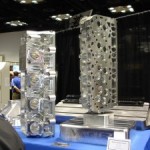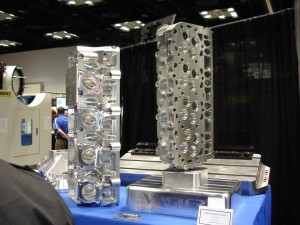Don’t Gamble When Choosing Cylinder Heads
A cylinder head is much more than a casting that tops off the block, holds the valves and forms the combustion chambers. The head works in combination with the camshaft, induction and exhaust systems to determine how the engine breathes, the engine’s power curve and personality. The “right” cylinder head on an engine will deliver peak power in the RPM range where you want it. The engine will have good throttle response and produce the kind of torque and horsepower numbers you want. Head selection, therefore, is a key ingredient in building a winning performance engine.
Let’s start with the basics. Assuming you are going to choose an aftermarket cylinder head, you have to find out what’s available for the engine you want to build. For popular engines like small block and big block Chevy, Ford and Chrysler engines, there are dozens of head configurations, brands and product lines from which you can choose. The selection can be so overwhelming that sometimes it comes down to eenie, meenie, minee, moe to pick a head.
Some people pick a set of cylinder heads based on name brand, previous experience or word-of-mouth recommendations. Some will shop around for the least expensive set of heads that promise to meet their expectations. Others will make their selection based strictly on which set of heads claims the highest air flow numbers. But there’s a lot more that should be considered when choosing a set of cylinder heads.
Determine The Venue
Price, performance and availability are all important considerations in the head selection process. But equally important is choosing a set of cylinder heads that are right for the engine and the application. Building a street performance engine is different than building a circle track engine, a drag engine, a marine engine, or a truck pull engine.
Each type of application has its own unique requirements, so the heads have to have the right flow characteristics for that application.
Basic considerations include such variables as engine displacement, compression ratio, camshaft lift and duration specifications, RPM range (where the engine should make the most horsepower and torque), and target horsepower (be realistic!).
You also need to consider vehicle weight, type of transmission (manual or automatic), torque converter stall speed (if automatic), gearing (transmission and differential), and most importantly the application itself (street, street/strip, drag, circle track, road race, off-road, etc.).
Street engines spend most of their time between idle and part throttle so they must have good low and mid-range torque and throttle response to be drivable — especially in heavier cars with automatic transmissions. For this type of application, you want a set of heads with stock to moderately larger intake runner volumes to keep air velocity high. Peak valve lift is probably going to be no more than about half an inch with a typical street cam, so a set of heads that claims huge airflow numbers at extreme valve lifts would not be your best choice. Too much head can be counter productive in this type of application.
A drag engine runs at full throttle for a quarter mile. For this kind of application, you want lots of valve lift, duration and airflow at high RPM. Bigger is better in terms of intake runner volumes, valve size and peak airflow numbers provided the engine has the cam, induction system and cubic inches (or boost pressure) to handle it.
April Engine Builder Shop Solutions
Combustion Chamber Molds
When making chamber molds for a variety of purposes, including holding up the valves on the assembly bench, (as opposed to a beanbag or shop rag) common auto body filler (Bondo) works very well. It’s fast and very inexpensive.
Just mix the body filler and fill chambers of an assembled head. The molds release easily if you just spray a little silicone into the chamber for a release agent before filling. At pennies per mold, it’s a very practical way to make enough molds of each chamber for assembling heads or for many other purposes such as determining piston dome requirements, valve relief locations, etc.
Keith Morganstein
Max Effort Engines
Sutton, MA
Metal Chips in the Media
To save money on media blasting, I use the metal chips generated from my boring bar and brake lathe as a blasting media. I installed a reducer in the feed line to generate the correct amount of air speed, then use the chips instead of glass bead. I get a nicer finish on both iron and aluminum parts.
Gary Musman
Channel City Engineering
Santa Barbara, CA
On a More Personal Note…
I got a handwritten letter in the mail this week, and since it’s so unusual these days, I opened it first.
Inside there was a plain note card with these words scrawled in neat block letters, “Hi Steve, just a quick note to thank you for your recent order. We appreciate your business.”
Hand-addressed envelopes always get opened. Handwritten letters always get read. A creative machine shop marketer could mail notes to local engine installers asking them to drop by the shop for a free cup of coffee and a tour, or the note might offer a discount on a portion of their next job.
The note doesn’t have to be long. In fact, the shorter the better. And for the price of a $.49 stamp, you just can’t beat this cost effective marketing tool.
Steve Rich
Sterling Bearing Inc.
Kansas City, MO
Get the Job Into the Shop
When I get a call for an engine rebuild, I am not immediately willing to give an exact price over the phone. I like to give a ballpark estimate and tell them that not until after we take it apart and check out the job completely, will we be able to give them a better idea on the exact price. I encourage them to bring it to me to check out first. Once that job comes through the door, I have the potential to make it a bigger sale instead of spending time on the phone debating with them the cost without ever seeing the job.
Jeffrey Myers
MAR Automotive, INC
Philadelphia, PA
Roller Timing Set Block Clearance
When using a Double Roller timing set on a GM 350 Vortec or a GM K block, you must check the clearance between the cam gear and the bosses around the oil galleys in the block. Some blocks may need to have some grinding done for clearance and on some this was already done at the factory.
An easy way to check is to place the cam gear on a camshaft then carefully install your cam into the block.
Now, just spin the gear and if you see it hitting the block just grind on the bosses until the gear has plenty of clearance. If not done, the gear will grind off metal filings that will be carried throughout the motor by the oil and we all know the damage this can cause.
Greg Myall
Engine and Performance Warehouse
Oakland, CA
Cylinder Liner Cavitation Erosion
Cavitation erosion is often found in diesel engines on the exterior walls of wet cylinder liners. The amount of erosion and decay will vary from engine to engine and may also vary from cylinder to cylinder. Vertical strips or patches of decay often form outside the cylinder corresponding with the piston thrust face. They also form just over the top sealing ring of the liner. If not kept in check, coolant may eventually penetrate the cylinder and contaminate the oil or oil may be introduced to the coolant.
It has been proposed from a group of engine rebuilders and parts manufacturers that this cavitation erosion is caused by excessive harmonic vibrations in the engine and possibly by or in conjunction with loose fitting cylinder liners. Both cause the formation and implosion of vapor bubbles within the coolant which attack and erode the cylinder liner surface. Vibration is caused as the pistons move up and down within the cylinders, especially at the piston thrust area. The surface of the cylinder sleeve that comes in contact with the coolant is moving in and out very quickly. During this process small bubbles are produced and struck. The resulting implosion causes shock waves against this surface that have been calculated to reach over 10,000º F and pressures more than 10,000 psi.
Cost effective materials to manufacture parts from that would prevent this cavitation erosion have not yet been found. Some coatings have been applied to slow the decay and extend engine life before major repairs are needed. A reduction in harmonic vibrations will also eliminate cavitation. Correct fitting liners cannot be over stressed. Incorrect clearance between liner and cylinder block can be a serious contributor to liner vibration. In many cases cavitation can be avoided by making sure the fuel injection complies with the manufacturer’s specifications, the engine’s speed is governed according to the manufacturer’s data and that these controls function.
Supplementary Cooling Additives (SCA) are specified by manufacturers and these additives form a protective coating on surfaces exposed to the coolant in an effort to reduce cavitation erosion.
Following proper maintenance schedules will help keep the proper level of concentrations of these SCA’s aiding cavitation protection, to maintain proper pH to avoid corrosion and to check water hardness to avoid mineral deposit formation. All manufacturer’s recommendations regarding additives, coolants and coolant filters as well as maintenance schedules should be strictly adhered to and followed at all times.
Engine Pro Technical Committee with thanks to Howard Enterprises
The post April Engine Builder Shop Solutions appeared first on Engine Builder Magazine.
Read more here: Engine Builder Magazine
Category: Featured, Features, Tech Center, April Shop Solutions
April Engine Builder Shop Solutions
Combustion Chamber Molds
When making chamber molds for a variety of purposes, including holding up the valves on the assembly bench, (as opposed to a beanbag or shop rag) common auto body filler (Bondo) works very well. It’s fast and very inexpensive.
Just mix the body filler and fill chambers of an assembled head. The molds release easily if you just spray a little silicone into the chamber for a release agent before filling. At pennies per mold, it’s a very practical way to make enough molds of each chamber for assembling heads or for many other purposes such as determining piston dome requirements, valve relief locations, etc.
Keith Morganstein
Max Effort Engines
Sutton, MA
Metal Chips in the Media
To save money on media blasting, I use the metal chips generated from my boring bar and brake lathe as a blasting media. I installed a reducer in the feed line to generate the correct amount of air speed, then use the chips instead of glass bead. I get a nicer finish on both iron and aluminum parts.
Gary Musman
Channel City Engineering
Santa Barbara, CA
On a More Personal Note…
I got a handwritten letter in the mail this week, and since it’s so unusual these days, I opened it first.
Inside there was a plain note card with these words scrawled in neat block letters, “Hi Steve, just a quick note to thank you for your recent order. We appreciate your business.”
Hand-addressed envelopes always get opened. Handwritten letters always get read. A creative machine shop marketer could mail notes to local engine installers asking them to drop by the shop for a free cup of coffee and a tour, or the note might offer a discount on a portion of their next job.
The note doesn’t have to be long. In fact, the shorter the better. And for the price of a $.49 stamp, you just can’t beat this cost effective marketing tool.
Steve Rich
Sterling Bearing Inc.
Kansas City, MO
Get the Job Into the Shop
When I get a call for an engine rebuild, I am not immediately willing to give an exact price over the phone. I like to give a ballpark estimate and tell them that not until after we take it apart and check out the job completely, will we be able to give them a better idea on the exact price. I encourage them to bring it to me to check out first. Once that job comes through the door, I have the potential to make it a bigger sale instead of spending time on the phone debating with them the cost without ever seeing the job.
Jeffrey Myers
MAR Automotive, INC
Philadelphia, PA
Roller Timing Set Block Clearance
When using a Double Roller timing set on a GM 350 Vortec or a GM K block, you must check the clearance between the cam gear and the bosses around the oil galleys in the block. Some blocks may need to have some grinding done for clearance and on some this was already done at the factory.
An easy way to check is to place the cam gear on a camshaft then carefully install your cam into the block.
Now, just spin the gear and if you see it hitting the block just grind on the bosses until the gear has plenty of clearance. If not done, the gear will grind off metal filings that will be carried throughout the motor by the oil and we all know the damage this can cause.
Greg Myall
Engine and Performance Warehouse
Oakland, CA
Cylinder Liner Cavitation Erosion
Cavitation erosion is often found in diesel engines on the exterior walls of wet cylinder liners. The amount of erosion and decay will vary from engine to engine and may also vary from cylinder to cylinder. Vertical strips or patches of decay often form outside the cylinder corresponding with the piston thrust face. They also form just over the top sealing ring of the liner. If not kept in check, coolant may eventually penetrate the cylinder and contaminate the oil or oil may be introduced to the coolant.
It has been proposed from a group of engine rebuilders and parts manufacturers that this cavitation erosion is caused by excessive harmonic vibrations in the engine and possibly by or in conjunction with loose fitting cylinder liners. Both cause the formation and implosion of vapor bubbles within the coolant which attack and erode the cylinder liner surface. Vibration is caused as the pistons move up and down within the cylinders, especially at the piston thrust area. The surface of the cylinder sleeve that comes in contact with the coolant is moving in and out very quickly. During this process small bubbles are produced and struck. The resulting implosion causes shock waves against this surface that have been calculated to reach over 10,000
Snapchat just made itself a little more useless
This can’t be emphasized enough: You really shouldn’t expect everything you send over Snapchat to remain private. The New York Times points out that Snapchat has added a new feature in its latest update that will let you easily save any text message that you receive over the service, which is something that you traditionally haven’t been able to do for the pictures that are sent through the app.
Read more here: Boy Genius Report
LG G3’s most important feature has just been confirmed
LG’s next flagship smartphone has been long rumored to offer users a high-resolution display, and the company has just confirmed just how great its screen will be. In a press release, LG said that a 5.5-inch Quad HD (QHD) AH-IPS LCD panel for smartphones was certified as a QHD display after passing tests by NEMKO, the Norway-based international testing and certification organization for electrical products.
Read more here: Boy Genius Report
This is how much the Moto X+1 will cost
Motorola has been careless enough to reveal more details on its website about its upcoming Moto X+1 flagship handsets, shortly after it confirmed the phone’s name on a MotoMaker page. Droid-Life has found more evidence that suggests the Moto X+1 will be soon launched, including carriers mentions, as well as leather options for the phones rear case.
Read more here: Boy Genius Report
This incredible handheld scanner breaks down what you’re eating molecule by molecule
Now this is an incredible way to count calories. Israeli company Consumer Physics has launched a new Kickstarter project that might be the most ambitious idea we’ve yet seen on the popular crowd-funding website. The product is called SCiO and it’s essentially a handheld spectrometer that breaks down an object’s compounds by scanning the way that light interacts with its molecular vibrations to determine its unique optical signature.
Read more here: Boy Genius Report
Here’s one place where humans are coming to steal robots’ jobs
Man bites dog, human steals robot’s job? That’s sort of the story in Japan, where SingularityHub reports that Toyota is temporarily replacing robots with human workers so they can figure out what the robots can do better and thus build more efficient robots. Essentially, Toyota has found that you can’t rely entirely on robots to do all the work for you if you hope to keep boosting their productivity — rather, you need humans who have knowledge of the production process teach them better ways to build cars.
Read more here: Boy Genius Report
AOL’s dialup business might finally, finally die in 5 years
Millions of Americans are still trapped in AOL dialup hell… but they might not be for much longer. Jackdaw Research chief Jan Dawson has put together a handy chart showing AOL’s operating income before depreciation and amortization (OIBDA) by segment and he concludes that, based on AOL’s current dialup subscriber churn rate, the company “has another 5 years before dialup business dies and it has to find a new source of profit.”
Read more here: Boy Genius Report
Titanfall sales totaled nearly 1 million after just three weeks
Ahead of its release back in Mach, Titanfall was rumored to have helped Microsoft sell as many as 1 million Xbox Ones. That rumor was never confirmed nor denied, but now we know how many copies of Titanfall sold last quarter, and it looks like the rumor is at least plausible. According to NPD numbers cited by COO Peter Moore, EA sold 925,000 copies of Titanfall last quarter. These numbers don’t include digital sales bought from EA’s Origin PC service or from the Xbox One dashboard. They also don’t include worldwide sales.
Read more here: Boy Genius Report





















